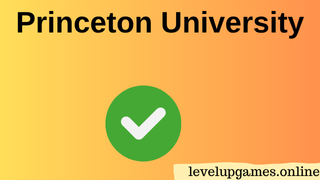🏛️ Overview & History of Princeton University
Founded in 1746 in Princeton, New Jersey, Princeton University is one of the oldest and most prestigious Ivy League institutions in the United States. Known for its strong commitment to undergraduate education and cutting-edge research, Princeton has nurtured leaders in every field for over 275 years.
Key Historical Milestones
- 1746: Established as the College of New Jersey.
- 1896: Officially renamed Princeton University.
- 20th Century: Expanded to include graduate and professional schools.
- Today: A global leader in liberal arts education and innovative research.
📝 Step-by-Step Application Process
How to Apply to Princeton University
| Applicant Type | Deadline | Requirements | Fees (USD) | Scholarships Available |
|---|---|---|---|---|
| Undergraduate (US) | Nov 1 (EA), Jan 1 (RD) |
|
$70 (waivers available) | Need-based scholarships only |
| Undergraduate (International) | Nov 1 (EA), Jan 1 (RD) |
|
$70 (waivers available) | Need-based scholarships only |
| Graduate (US/Int’l) | Varies by program (usually Dec–Jan) |
|
$65–$115 | Fellowships, assistantships |
For the latest deadlines and requirements, always check the official Princeton University admissions website.
🏫 Campus Life & Student Experience at Princeton University
A Thriving, Supportive Community
Princeton University offers a close-knit, intellectually vibrant campus life. With residential colleges fostering community and more than 300 student organizations, Princeton encourages both academic rigor and personal growth. Campus traditions like the “Princeton Reunions” and “Princeton Triangle Club” create lifelong memories.
Housing & Dining
- Undergraduate residential colleges with dedicated faculty advisors
- Diverse dining halls with local and international cuisine
- Graduate housing options near campus
Student Support
- Mental health and wellness services
- Comprehensive career counseling
- Academic tutoring and writing centers
🎓 Academic Programs & Popular Majors
Princeton offers world-class academic programs across humanities, social sciences, natural sciences, and engineering. Undergraduate focus combined with cutting-edge graduate research provides a holistic education.
Popular Majors at Princeton University
- Economics
- Computer Science
- Public and International Affairs
- Engineering (Electrical, Mechanical, Chemical)
- Biology
- Politics
- History
Interdisciplinary Opportunities
Students benefit from cross-department collaborations, research centers, and study abroad programs that broaden their academic horizons.
🏢 Facilities & Resources
Princeton’s historic and modern facilities support a vibrant academic and extracurricular life:
- Firestone Library, one of the largest open-stack libraries worldwide
- Princeton Plasma Physics Laboratory and Keller Center for Innovation
- Art museums and performance venues
- Advanced research labs and computing centers
- Athletic facilities including stadiums and fitness centers
These resources provide students and faculty with unmatched support for learning and innovation.
✅ Admission Requirements for Princeton University
Undergraduate Admission
- Completed Common Application or Coalition Application
- Official high school transcripts
- SAT or ACT scores (optional for 2025 admissions)
- English proficiency tests for non-native speakers (TOEFL, IELTS)
- Personal essays and teacher recommendations
- Application fee or waiver
Graduate Admission
- Bachelor’s degree or equivalent from an accredited institution
- Graduate school online application and official transcripts
- GRE/GMAT scores where applicable
- Statement of Purpose
- Letters of recommendation
- Resume/CV
- English proficiency test scores for international applicants
💵 Tuition & Financial Aid Options
Princeton University offers generous financial aid packages to ensure affordability for all admitted students.
Tuition & Estimated Costs (2025–26)
- Undergraduate tuition: $60,000/year (approximate)
- Graduate tuition: Varies by program, typically $50,000–$60,000/year
- Room & board: Approximately $18,000/year
- Books and personal expenses: Around $3,500/year
Financial Aid & Scholarships
- Need-based aid covering full demonstrated financial need
- Princeton’s “No Loan” policy reduces debt burden
- Graduate fellowships, assistantships, and external scholarships
Over 60% of undergraduates receive financial aid, making Princeton affordable to a broad spectrum of students.
👍 Pros & Cons of Studying at Princeton University
| Pros ✅ | Cons ❌ |
|---|---|
|
|
🌟 Notable Alumni & Achievements
- Jeff Bezos – Founder of Amazon
- Woodrow Wilson – 28th President of the United States
- Alan Turing – Pioneer of computer science (honorary degree)
- Michelle Obama – Former First Lady of the United States
- Over 70 Nobel laureates among faculty and alumni
📝 Final Expert Review & Recommendation
Princeton University combines a tradition of academic excellence with a supportive and inspiring campus environment. For students seeking a rigorous yet nurturing education at one of the world’s leading universities, Princeton offers outstanding resources, a vibrant community, and a commitment to accessibility through generous financial aid.
Recommendation: If you want a transformative academic experience in a historic Ivy League setting with unparalleled mentorship and support, Princeton University should be at the top of your list.
❓ Frequently Asked Questions About Princeton University
What is Princeton University best known for?
Princeton University is renowned for its strong undergraduate focus, academic excellence in humanities and sciences, and prestigious research programs.
How difficult is it to get admitted to Princeton University?
Admission is highly competitive, with acceptance rates typically below 6%, requiring outstanding academic and extracurricular achievements.
Does Princeton University offer financial aid to international students?
Yes, Princeton offers need-based financial aid to international students, ensuring affordability for admitted students worldwide.
What is campus life like at Princeton University?
Campus life is active and supportive with numerous clubs, residential colleges, and cultural events fostering strong community engagement.
Are English proficiency tests required for non-native speakers?
Yes, international applicants typically must submit TOEFL or IELTS scores unless they meet specific exemption criteria.

